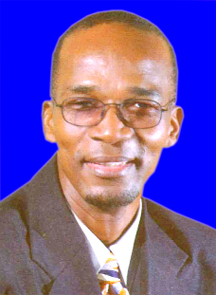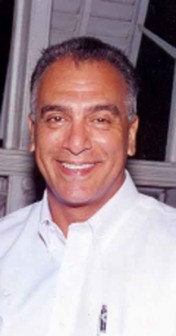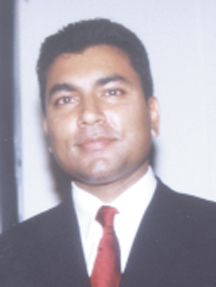Although the PPP/C would have seen its votes dip significantly at the November 28 polls, PNCR-member-turned-PPP/C-supporter Joe Hamilton says it is erroneous to claim that the public endorsement of Donald Ramotar’s candidacy by figures previously associated with the opposition did not result in votes for the incumbent party.
Hamilton’s views were echoed by former Guyana People’s Partnership leader Peter Ramsaroop, who, after initially supporting opposition coalition A Partnership for National Unity (APNU), threw his support behind the PPP/C.
However, Dr Cheddi ‘Joey’ Jagan, who was a fervent critic of the Jagdeo-administration in recent years before he endorsed Ramotar and joined the PPP/C’s list of candidates, told Stabroek News that it is impossible to determine the impact these endorsements had on voters, since no real polls are conducted on these matters. He acknowledged, however, that normally when politicians cross the floor it does not have much of an impact on voters.

Former trade unionist and PNCR member Gillian Burton, former AFC executive member Gomattie Singh and former member of the Reform component of the PNCR, Dr Joseph Haynes were also among the former opposition personalities who endorsed the PPP/C ahead of the polls.
While the PPP/C was able to chalk up its fifth successive victory at the polls with 166,340 votes (48.6 %), it failed to get the majority as it had done successfully since assuming office in 1992. Significantly, the party lost 17,000 votes from the 2006 elections. On the other hand, APNU with 139,638 votes and the AFC with 35,333 votes combined to secure 32,000 more votes than the PNCR-1G and AFC managed in 2006. Voter turnout measured at 72.9%, which represented a rise over the 68.82% recorded at the last elections but which was still significantly lower than the turnout for elections since 1992.

Asked to respond to the view that the plethora of endorsements of the PPP/C by figures such as himself had failed to bring votes to the party, Hamilton disagreed that this had occurred. Without going into any specifics, he said the party gained votes in certain non-traditional areas. Had this not been the case, he contended, the PPP/C would not have gotten so many votes.
‘Disconnect’
Hamilton, however, said that the results were “an eye opener for Guyanese and all politicians.” Admitting that he was surprised that the PPP/C did not secure enough votes to be awarded a majority in the National Assembly, Hamilton said the results suggested a disconnect with the citizens and political management. He said the party will now have to seriously analyze why it lost votes. While noting that apathy played a part, he said the party should now determine why voters were apathetic. He disagreed with the assessment by Robert Persaud, PPP/C’s campaign manager, who said that the party’s supporters were complacent because they were assured of the victory. Persaud’s statements, Hamilton said, were most likely political utterances made in his first statement to the press after the official announcement of results. Persaud’s explanation was subsequently echoed by former president Bharrat Jagdeo.

Regarding voter apathy, Hamilton said that many persons claimed that government officials—including the political types—who were previously inaccessible to them suddenly became accessible just before the elections. He said too that while persons appreciated the infrastructural work being done by the government, a lot of this work lacked “a personal human touch.” Further, many persons complained about the high level of the value-added tax (VAT), indicating while they have no problem with the tax, the percentage being charged is too steep and is proving to be a burden to them.
Apart from voter apathy, Hamilton said that the crossing over of Moses Nagamootoo from the PPP/C to the AFC was an instrumental factor in the PPP/C losing votes. He said the PPP/C lost support in its strongholds of Region 6 and Regions 2, where the AFC experienced gains. The PPP/C received almost 10,000 less votes in Region 6 than it did in the last elections, while the AFC notched up 11,634 votes – almost 8,000 more than it recorded in the Region in 2006. Hamilton, who was partly responsible for the party’s activities along the East Coast Demerara, said that in several villages that traditionally voted for the PPP/C—such as Lusignan, Enmore, Annandale—the AFC came in second ahead of APNU.
Regarding APNU, Hamilton said that the coalition was able to regain votes in regions 4 and 10 that the PNCR-1G would have ceded to the AFC in 2006. This, he said, most likely had to do with the fact that Khemraj Ramjattan, and not Raphael Trotman was the AFC’s presidential candidate this time around. The AFC increased its overall tally by roughly 7,000 votes at the recent polls. “The AFC’s constituency in 2006 is not the same, that’s why they have to continue Nagamootoo’s bid for the speakership,” Hamilton said, while opining that this was the party that could suffer the most in terms of impact on its support base by whatever happens in the National Assembly. APNU’s support base, Hamilton opined, has reached its highest level. In Regions 3, 4, 7, 9 and 10, APNU posted significant gains over the PNCR-1G’s results in the last elections, with an increase of over 3,000 votes in Region 3, over 16,000 in Region 4 and over 4,000 in Region 10. Overall, APNU recorded a gain of about 25,000 votes over the support that the Robert Corbin-led PNCR-1G received in 2006.
Hamilton, who joined the Civic group, is now set to become the Parliamentary Secretary for the Ministry of Health when Parliament convenes. He will be a non-voting member of the House. He said it would be interesting to see how the parties work together to manage the new situation in which the country finds itself in the best interest of all Guyanese.
‘Small things’
Meanwhile, Cheddi ‘Joey’ Jagan, the son of the late presidents Cheddi and Janet Jagan, also indicated that he felt the PPP/C would have gotten a majority. The results, he said, came as a surprise not only to him but to many others in the PPP/C. In his view, it was the failure of the PPP/C to do “the small things” to make the life of citizens better that cost the party the majority, since many people became frustrated and stayed home. These “small things,” he said, included dealing with flooding in certain areas, developing playfields etc.
Questioned about the impact of Nagamootoo, Jagan said that the former PPP member did play a role, since he was able to take advantage of the people’s frustrations on the ground. He said he was optimistic that the PPP/C could pull these votes back from the AFC, the same way APNU under Granger’s leadership was able to pull back PNCR votes from the AFC. According to him, the PPP/C will have to examine the problems in its electioneering strategy.
He too disagreed with Persaud’s explanation that complacency among traditional supporters caused the PPP/C to lose its majority. “I don’t agree with that…not really. It wasn’t just complacency… it is an easy explanation but it is not the truth of the matter,” Jagan said. The PPP, he said, is wise enough to properly assess the situation. He also opined that racial voting was evident at the recent polls.
Meanwhile, Jagan said the parties should now work together towards addressing the immediate needs of the citizenry such as improving Georgetown. Politics, he said, need to be put aside and problems adequately addressed. Jagan said that ideally he would like to see a national unity government but he is not optimistic this would happen.
Elaborating on this vision, Jagan said he would not have minded if the PPP/C and APNU had joined together to form the government, while the AFC remained in opposition. His only reason for keeping the AFC in opposition, he said, is because there is the belief that a government needs to have an opposition. He said he would forego elections and allow the national unity government to function for 10 years and see if something new could be developed. Elections, he said, only divide Guyanese.
Majoritarian rule is evil,” he said, while adding that he wanted to see his father’s legacy, where people are treated fairly and where there is a politics of accommodation and inclusion, continue.
Jagan, who like Hamilton joined the Civic group, said he was not interested in any governmental post. His main concern, he said, was seeing his father’s legacy preserved and he said he will continue to fight for this.
Contrary to Hamilton and Jagan, Ramsaroop, said that he was not fully surprised by the elections results and said it gives “Guyana a new life on political management.
“The people created their own form of shared governance which is historical, given that we as politicians failed to deliver such results and the people had to do it for us. The governing party, opposition and civil society must use this opportunity to make lasting changes in both economics and governance.”
Ramsaroop, who unlike Hamilton and Jagan, never joined the PPP/C but merely endorsed Ramotar’s candidacy, said he had no regrets about his decision. “I have consistently advocated for major industrial and economic infusion such as the road to Brazil, a deep water harbour and comprehensive tax changes and said that these projects, which are in the PPP/C plan, can be a reality in the next five years if we can work together as nation,” he said. “I have no regret as even if I had stayed in the opposition ranks these would have been the same issues I would have advocated for. Why not be part of the solution instead of the problem?” he added.
“I believe that President Ramotar has the best personality and experience to build a cohesive approach where all Guyanese benefit. The challenge will be to put in place institutional changes and start the process of constitutional reform. Those were the discussions we had prior to the 2011 elections. The PPP must make changes over the next 5 years in order to be competitive,” he continued.
Ramsaroop said that their endorsement was a pre-election start of some form of shared governance, demonstrating that we can all balance our political ideology with the nation needs. He told Stabroek News he would assist the President if asked to do so, while emphasizing that there were no pre-conditions or negotiations prior to his endorsement.





